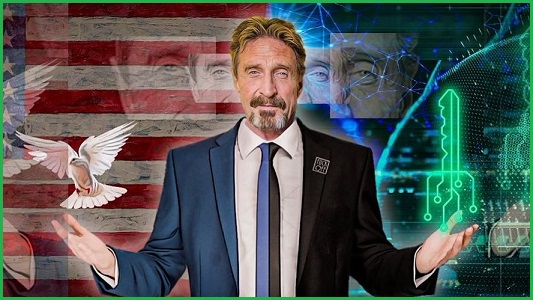John McAfee, founder of the McAfee anti-virus company, has died in a Spanish prison cell, aged 75.
It is understood McAfee took his own life.
“This is the result of a cruel system that had no reason to keep this man in jail for so long,” said McAfee’s lawyer Javier Villalba, according to Reuters.
Last October, McAfee was arrested in Barcelona where he faced extradition to the US for charges relating to tax evasion.
According to the US Justice Department, McAfee allegedly failed to report income earned from promoting cryptocurrencies, consulting work, public speaking, and selling his life story for a film between 2014 and 2018.
He had also been charged by the US Securities and Exchange Commission on fraud charges related to his promotion of cryptocurrencies and initial coin offerings (ICOs) on social media.
The Spanish Supreme Court approved the US request to extradite McAfee hours before he was found dead.
Another of McAfee’s layers, Andrew Gordan, told the New York Times his team “was fully prepared to fight for [McAfee’s] innocence before the United States court” upon learning of the extradition approval.
“We knew he would appreciate the opportunity to share his story and put the false charges against him to rest,” he said.
“Only hours later, we were shocked to learn of his untimely death.”
McAfee promoted the theory that convicted sex offender Jeffrey Epstein did not kill himself in 2019, and regularly referenced Epstein in his tweets.
In 2019, McAfee showed a tattoo on his arm that said "whackd" and said he was inked in reference to US law enforcement.
"If I suicide myself, I didn't," he tweeted. "I was whackd. Check my right arm."
Shortly after Spanish police arrested him, McAfee tweeted from jail that he "was content" and had "friends" in prison.
"The food is good. All is well," McAfee tweeted.
"Know that if I hang myself, a la Epstein, it will be no fault of mine."
I am content in here. I have friends.
— John McAfee (@officialmcafee) October 15, 2020
The food is good. All is well.
Know that if I hang myself, a la Epstein, it will be no fault of mine.
His and Jeffrey Epstein's names have been trending on Twitter since McAfee's death was revealed on Thursday morning as internet sleuths and conspiracy theorists look to connect dots between the two high profile deaths.
Entrepreneur, libertarian, cryptocurrency evangelist
McAfee made his name from the anti-virus company McAfee Associates which he created in 1987.
McAfee left his company in 1997 and founded other software companies and invested in property, causing his personal wealth to be severely impacted by the Global Financial Crisis (GFC).
Intel purchased McAfee Associates in 2011 before spinning it off in 2016 as McAfee Corp.
A libertarian, McAfee unsuccessfully ran for the Libertarian Party’s US presidential nomination in 2016 and again in 2020.
McAfee was a cryptocurrency evangelist and bitcoin bull who famously said in 2017 he would “eat [his] dick on national television” if the price of bitcoin didn’t reach $500,000 by 2020.
For a man who was burned by the financial crisis – his wealth crashed from around US$100 million at its peak to US$4 million after the GFC, according to the New York Times – cryptocurrency was a way of regaining financial control which he believed offered more freedom than fiat currency controlled by central banks.
Why power corrupts. pic.twitter.com/cwbKHcaQsd
— John McAfee (@officialmcafee) June 17, 2020
Cryptocurrency was also a means for McAfee to trade his profile for money as he shilled the virtues of various crypto ventures on Twitter.
Information Age interviewed McAfee from an undisclosed location via Skype in 2019 during which he admitted he had not paid income taxes for a decade.
“I send letters to the government saying ‘I’m not filing, I’m not paying’. For eight years they ignored me,” McAfee said at the time.
“About two years ago, I started speaking out about cryptocurrency and how cryptocurrency could free people from government financial control, or even paying taxes.
“If you use a privacy coin and a distributed exchange, and if you want to tell the government how much coin you have, you can, but if you don’t, there’s no way they can ever know.
“When I started saying that, they convened a grand jury to indict [my wife] Janice, myself, and four of our workers for tax issues."
If you or someone you know needs help, contact Lifeline on 13 11 14 , Beyond Blue on 1300 224 636 or the Suicide Call Back Service 1300 659 467.










